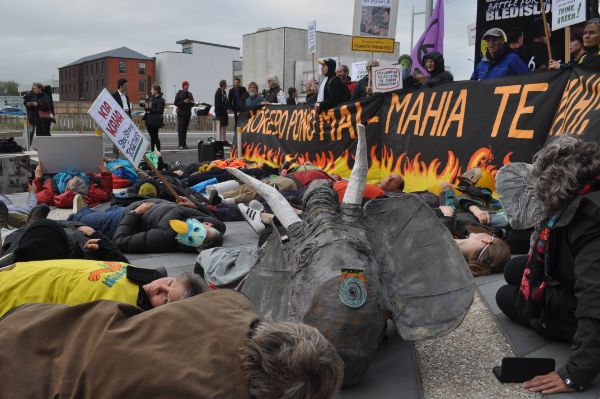Climate Activist Die-in At Christchurch Leaders Debate

Tuesday, 6 October: There was drama inside and outside the Christchurch Town Hall tonight (October 6) at the Press Leaders Debate. On stage, Labour leader Jacinda Ardern and National leader Judith Collins discussed their respective parties’ policies for the upcoming election, while outside climate activists challenged the leaders on their inaction in the current climate emergency.
Representing a range of groups including Extinction Rebellion Ōtautahi, SAFE, School Strike 4 Climate, and 350, the climate activists, in animal costumes, ‘died’ on cue outside both entrances to the Town Hall. They said the die-in provided a visual representation of one of the impacts of the climate emergency, the ongoing threat to ecosystems, and they acknowledged their presence on Ngāi Tūāhuriri land.
“The great forests of the world are on fire – from California to Siberia, the Amazon to Australia – every summer now. Meanwhile in Aotearoa neither of the leading political parties is committed to the scale or depth of change we need to survive the crises coming at us – climate disasters, ecosystem collapse, food security and more,” said Torfrida Wainwright, from Extinction Rebellion Ōtautahi.
“For both parties it seems to be business as usual, with GDP growth the key driver. There is no recognition that humanity reached the limits to growth long ago, and that we urgently need a new vision of how to live together and thrive. We ask our leaders: Whakamanatia te whenua – restore the mana of the land!"
Climate change is driving an unprecedented global extinction event, and New Zealand flora and fauna are under threat. The danger to New Zealand native plants, animals and ecosystems was identified in the MFE’s Environment Aotearoa 2019 report, which stated that 90 percent of seabirds, 76 percent of freshwater fish, 84 percent of reptiles, and 46 percent of vascular plants are currently or will be at risk of extinction.
SAFE spokesperson Will Appelbe said more needs to be done if we are to avoid the worst effects of the climate emergency. "Animal agriculture is our largest contributor to our greenhouse gas emissions. We need to do better, and we can, if our politicians show strong leadership. Our very future depends upon the decisions being made right now. For humans and animals, we need swift and decisive action to protect our planet."
The activists said it was vital that potential voters factor in climate policies when casting their votes. “What I am really concerned about is the lightly regulated industries whose activities pollute waterways and the air and impact on biodiversity and our health,” said Dave Evans, from Extinction Rebellion Ōtautahi. “When people vote I want them to be thinking long-term about the future of the natural world.”


 Gordon Campbell: On Why We Can’t Survive Two More Years Of This
Gordon Campbell: On Why We Can’t Survive Two More Years Of This Peace Action Ōtautahi: Bridge Of Remembrance Peace Protest
Peace Action Ōtautahi: Bridge Of Remembrance Peace Protest National Wetland Trust: Public Asked To Help Prevent Fires In Wetlands This Summer
National Wetland Trust: Public Asked To Help Prevent Fires In Wetlands This Summer Lillian Hanly, RNZ: The Year In Politics - Stories That Dominated The Headlines In 2024
Lillian Hanly, RNZ: The Year In Politics - Stories That Dominated The Headlines In 2024 Waikato Regional Council: Studies Open Door To Mercury Islands Underwater World
Waikato Regional Council: Studies Open Door To Mercury Islands Underwater World Office of the Privacy Commissioner: Christmas Is About Giving, But Don’t Give Up Your Privacy
Office of the Privacy Commissioner: Christmas Is About Giving, But Don’t Give Up Your Privacy The Rail Advocacy Collective: Chris Trotter - Running Us Off The Rails
The Rail Advocacy Collective: Chris Trotter - Running Us Off The Rails


